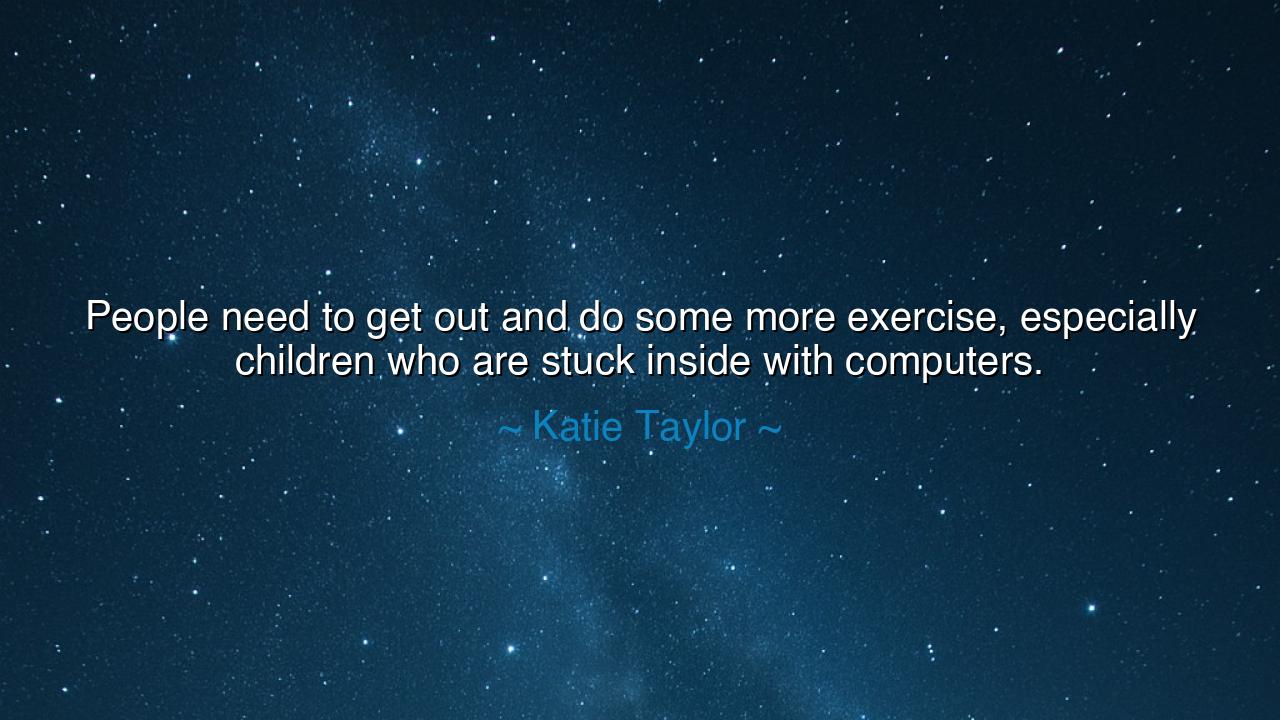
People need to get out and do some more exercise, especially
People need to get out and do some more exercise, especially children who are stuck inside with computers.






In the spirited and heartfelt words of Katie Taylor, Olympic champion and warrior of the ring, we find not merely advice about movement, but a plea for the restoration of vitality itself: “People need to get out and do some more exercise, especially children who are stuck inside with computers.” To some, this may seem a simple reminder about health — but to those who listen deeply, it is a call to awaken the sleeping body and reclaim the sacred bond between motion, freedom, and life. Taylor, whose body is her instrument and whose spirit was forged through discipline, speaks as both athlete and philosopher, urging us to return to the rhythm of the earth, to remember that strength of body nourishes strength of mind and soul.
From the dawn of civilization, the ancients understood that the body was not a vessel to be ignored, but a temple to be cultivated. The Greeks spoke of arete, the harmony between mind and body, in which physical excellence was inseparable from virtue. The Spartans trained their youth not only for war, but for resilience and balance. The Romans built their philosophy of discipline upon movement, understanding that action purifies the will. To live without movement, they believed, was to let the soul stagnate. Katie Taylor’s words echo this timeless truth — that a people confined to stillness forgets not only strength, but joy. The computer, that modern marvel, brings connection to the world, yet it also brings a new form of captivity — a silent, glowing prison in which the young spirit grows pale.
The origin of Taylor’s statement arises from her own life of motion and mastery. From her earliest days in Bray, Ireland, she learned that physical training was not a punishment but a path to freedom. Boxing taught her not merely how to strike, but how to endure, how to focus, how to rise. Her success was born from sweat, from hours of practice, from the rhythm of breath and the beating of heart. So when she speaks of the need for exercise, she does not mean mere sport; she means the awakening of the whole human being. Her message to children — “get out” — is not only about playing outdoors, but about escaping confinement of the body, mind, and spirit.
Throughout history, we see what happens when a people forgets the value of movement. The great empires of old, once vigorous and alive, grew soft when comfort replaced discipline. The Roman poet Juvenal once lamented that his people had traded their freedom for “bread and circuses,” choosing leisure over labor. And in our own time, we see a new form of this decay — a generation chained not by hunger, but by screens. Children, whose hearts should beat fast with play and discovery, now sit in the pale light of machines. Their eyes grow weary before they have seen the sunrise, and their limbs grow still before they have known their strength. Katie Taylor’s warning is not only for health, but for the soul of an age that risks forgetting its vitality.
Yet her words are not a condemnation; they are a summons to renewal. She calls us back to the open air, to the earth that waits beneath our feet, to the pulse of life that beats in our veins. When we move — when we run, climb, play, or train — we are not merely exercising the body; we are restoring balance to the spirit. The air fills our lungs, the blood awakens our heart, and the fog of thought clears from the mind. Movement, as Taylor knows, is not just an act of strength but an act of gratitude — a celebration of being alive.
Consider also the story of Milo of Croton, the ancient athlete who carried a young calf upon his shoulders every day until it became a full-grown bull. His strength grew not in a single moment of might, but through daily persistence — a living parable of how effort shapes destiny. Katie Taylor’s own journey follows the same path: discipline over comfort, persistence over distraction. In her world, every punch, every step, every drop of sweat is a declaration of life’s potential. She stands as proof that greatness is not inherited but earned through motion, through action, through the daily devotion of the body to the pursuit of purpose.
Let the lesson, then, be carried to all generations: move, for movement is the language of life. Do not let your children become prisoners of their screens. Lead them to the sunlit fields, the courts, the tracks, the rivers. Teach them that their bodies are not burdens but gifts — sacred instruments given to them to explore, to express, to endure. Let them discover, as Katie Taylor has, that the path to strength begins not with power, but with willingness — the courage to rise, to step outside, to breathe deeply, and to live fully.
For in truth, the human body was not made for idleness. It was made to strive, to reach, to play, to struggle, and to triumph. As Katie Taylor reminds us, health is not merely the absence of illness, but the presence of vitality — the radiant energy that makes life worth living. So, step out from the walls of comfort, and reclaim your birthright of motion. For when we move with purpose, when we embrace the discipline of the body, we awaken not only strength, but spirit — and in that awakening, we rediscover the oldest wisdom of all: that to live well is to live in motion.






AAdministratorAdministrator
Welcome, honored guests. Please leave a comment, we will respond soon